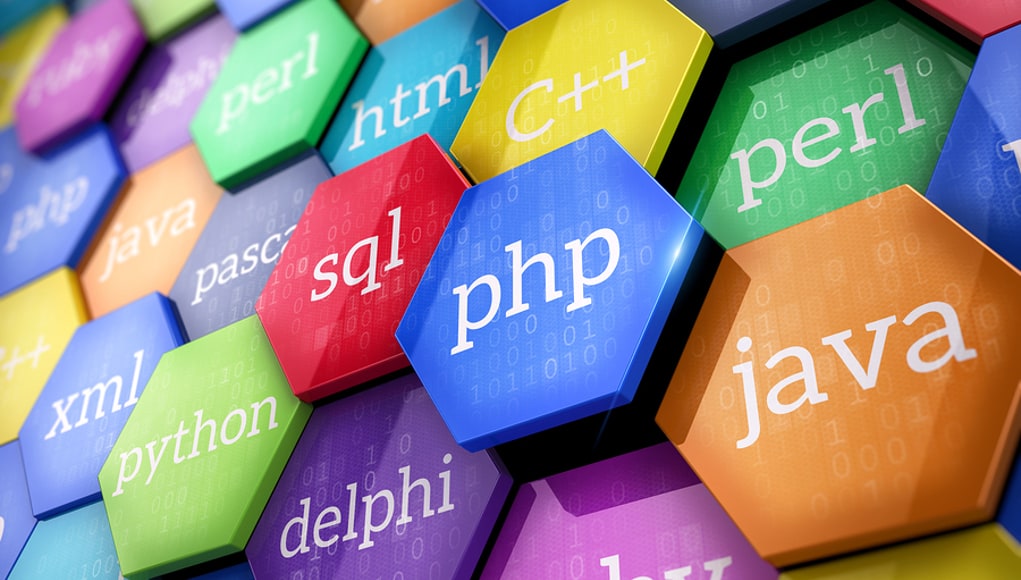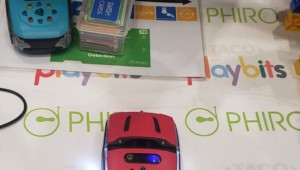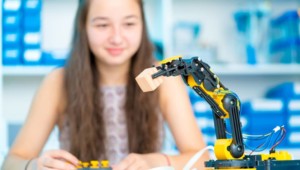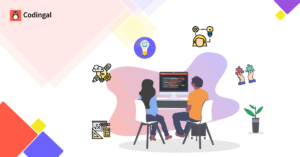Smart List: 22 Coding and Computer Science Resources

The U.S. Bureau of Labor Statistics estimates there will be 1.4 million computing jobs but only 400,000 computer-science graduates with the skills to fill them. Looking toward a future of work that includes automation, artificial intelligence and programming, there is no better time to introduce coding to your students. Earlier this month we celebrated #CSEdWeek, an annual program dedicated to inspiring K-12 students to take interest in computer science.
Coding & Computer Science Resources for Schools
1. AI4All is an organization dedicated to increasing diversity and inclusion in AI education, research, development, and policy. Their summer education programs are “an entry point into artificial intelligence and computer science for underrepresented high school students.
2. AI4K12. In May, the Association for the Advancement of Artificial Intelligence (AAAI) and the Computer Science Teachers Association (CSTA) launched the AI for K-12 Working Group (AI4K12) to define for artificial intelligence what students should know and be able to do. (see our latest feature)
3. Black Girls CODE is a non-profit organization dedicated to teaching girls ages 7-17 about computer programming and digital technology.
4. Code.org is an organization dedicated to expanding access to computer science in schools and increasing participation by women and underrepresented minorities. Start here for coding resources such as games, apps and courses. (see feature on CS4RI)
5. CodeHS is a teaching platform for helping schools teach computer science. They provide web-based curriculum, teacher tools and resources, and professional development.
6. CodeAcademy is an online catalog of coding course ranging from web development to programming.
7. CS for All Teachers is a virtual community of practice, welcoming all teachers from PreK through high school who are interested in teaching computer science. It provides an online home for teachers to connect with one another and with the resources and expertise they need to teach computer science in their classrooms.
8. The Computer Science Teachers Association (CSTA) is a membership organization that supports and promotes the teaching of computer science. They provide opportunities for K–12 teachers and their students to better understand computer science and to more successfully prepare themselves to teach and learn.
9. Exploring Computer Science is a year-long, research-based, high school intro-level computer science curriculum and teacher professional development program that focuses on broadening participation in computing. They support teachers and districts through the implementation of the course regardless of school resources.
10. The Hour of Code started as a one-hour introduction to computer science to show that anybody can learn the basics. However, In 2014, the executive committee of Computing in the Core (ACM, CSTA, NCWIT, IEEE-CS, Google, and Microsoft) voted unanimously to maintain the Hour of Code theme as the centerpiece of #CSEdWeek and just one year later it became the “largest education campaign in history” reaching 100 million “hours served.” (see feature on CSEdWeek and Hour of Code)
11. Khan Academy offers practice exercises, instructional videos, and a personalized learning dashboard that helps learners to study at their own pace in and outside of the classroom. (See their catalog of computer science courses)
12. Project Lead the Way provides learning experiences for PreK-12 students and teachers across the U.S. They create a hands-on classroom environment and aim to help students to develop the knowledge and skills they need to succeed. Additionally, they provide teachers with the training, resources, and support they need to engage students in real-world learning.
13. Raspberry Pi is a UK-based charity that works to put the power of computing and digital making into the hands of people all over the world. They do this so that more people are “able to harness the power of computing and digital technologies for work, to solve problems that matter to them, and to express themselves creatively.”
Coding Tools and Toys for Kids
14. Coding Express, presented by Lego Education, this game explores early coding concepts (we recently reviewed the Coding Express train, see our feature here)
15. Code Piano & Code Rocket are games designed to teach real C++ coding through hands-on electronics (see feature).
16. Fisher Price Think and Learn Code-a-pillar: A great first start to coding. Depending on how you put this guy together, it changes his course. Set a target and then build him to hit it.
17. LittleBits: is an education startup that invented the electronic building block. These magnetic “Bits” snap together to turn ideas into “inventions, transforming the way kids learn so they can grow up to be tomorrow’s changemakers.” (see feature)
18. Modular Robotics, creators of Cubelets robot blocks and the MOSS robot construction system. The toys they design aim to give young minds models for understanding and manipulating complex systems. By integrating learning and play, we hope to create a new generation of problem solvers that can better handle complexity and the problems that stem from interconnected systems.
19. Root, described as “a little robot with a lot of possibilities,” Root is “an educational robot that teaches coding, creativity, and problem-solving skills to kids from pre-readers through high school.” (see feature)
20. Scratch helps young people learn to think creatively, reason systematically, and work collaboratively. (See our feature on their coding cards)
21. Tynker helps kids learn to code using visual code blocks that represent real programming concepts. They progress to text languages like JavaScript and Python as they continue to play through 2,000+ interest-driven activities. (see feature)
22. MakerBot, founded in 2009, sells a variety of affordable, easy-to-use, wireless-enabled 3D printers and recognizes the revolution that 3D printing can bring to education. (see feature)
There are so many other great educational toys available if you’re doing any last minute shopping or planning for other special occasions in 2019. Check out our latest gift guide here.
We’re sure we missed some great resources. Which would you add? Share in the comments section below.
For more, see:
- NFL Players Helping Students Tackle the Challenges of Tomorrow Through Coding
- 3 Ways EdLeaders Can Level the Computer Science Literacy Playing Field
Disclosure: Tom Vander Ark is an advisor for AI4K12.
Stay in-the-know with innovations in learning by signing up for the weekly Smart Update.. This post includes mentions of a Getting Smart partner. For a full list of partners, affiliate organizations and all other disclosures, please see our Partner page.







Doug Estep
I am a computer science professor. I created an online tool to identify students that cheat on computer programming assignments. I think this service would make an excellent addition to your list. ( https://estepsoftwareforensics.com ).